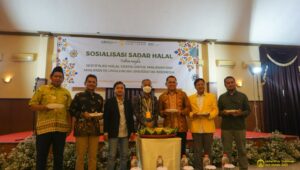
To realize Indonesia’s potential as one of the largest producers of halal products in the world, the Universitas Indonesia Halal Center (UIHC) together with the National Committee for Sharia Economics and Finance (KNEKS) and Bank Syariah Indonesia (BSI) are ready to facilitate business actors to obtain halal certificates for free. Through the “Halal Awareness Joint Movement”, this free halal certification activity includes halal awareness socialization, halal assistant training, assistance until halal certification is issued, and empowerment of business actors.
There is one halal certification method that is familiar to Micro, Small and Medium Enterprises (MSMEs) in Indonesia, namely Self Declare or ‘ self-declaration ‘ regarding the halal products they produce. UIHC as the official institution for the halal certification program in Indonesia will help MSME players obtain this halal certification through mentoring and training. This government program is held for free with a target of 324,000 MSMEs obtaining halal certification this year.
The Director of the KNEKS Halal Product Industry, Afdhar Aliasar, MBA., said that the halal certification program was implemented to encourage the sharia economy to grow and develop in Indonesia, especially in the UI campus. “We are together to carry out socialization so that halal food and drinks can be explained more properly in the UI environment. Great people grow from good food. Therefore, whatever the role of Mr/Mrs as a driver of MSMEs in the UI environment will give a very extraordinary meaning for the creation of superior products produced by UI from MSME programs, “said Afdhar.
There are specific criteria for products assisted by UIHC to obtain halal certification. These food and beverage products must be made from halal ingredients with an Islamic slaughter procession. The slaughterer of chicken or beef must be Muslim to fulfill one of the requirements of halal food. Products must also come from halal ingredients; not contain alcohol, pork, and so on; and not contain impurities such as feces, blood, and so on. Products should be free from names that refer to kufr, ghosts, demons, and other negatively-indicated names.

Currently, there are 65 million MSMEs in Indonesia. If it is targeted that by 2024 as many as 10 million MSMEs will be halal certified, this number is still relatively small. Therefore, UIHC is trying to overcome the barriers to halal certification.
Regarding the flow of halal certification registration, MSME players should have a Business Identification Number (NIB) issued by the Online Single Submission Institution which is integrated with therectorGeneral of General Legal Administration and therectorTaxes. Information on the requirements to create a NIB can be accessed through https://oss.go.id. Next, enterpreneurs can file registration for Halal Sertification at https://ptsp.halal.go.id.
Registrants can access, download, and fill out the Halal Product Guarantee System (SJPH) documents manually and choose the Self Declare halal certification mechanism using the sehati code22. They will also receive UIHC halal mentoring and assistance. There are two processes in this halal certification, namely assistance and halal production. Halal assistants will see the ingredients and equipment used in making the product. After everything is complete and deemed safe, the next process is a halal production evaluation by directly observing product manufacturing at the business workshop.
For MSMEs that successfully obtain a certificate, the validity period of this halal certification is 4 years. Halal certification for food and beverage products must be submitted before October 17, 2024. This obligation is in accordance with the rules in article 4 of Law Number 33 of 2014 concerning Halal Product Guarantee which requires MSME players to have halal certification for their products.
Chairman of ILUNI UI, Didit Ratam, said that ILUNI UI will collaborate with UIHC in supporting the implementation of this halal certification program. “ILUNI UI happens to be present at the UI Campus, various places in Jabodetabek, and other regions in Indonesia. This is a golden opportunity for ILUNI UI so that together we provide halal certification to all small and medium enterprises everywhere. Hopefully we can join hands in order to realize the target of hundreds of thousands and even millions of halal-certified MSMEs by 2024,” Didit said.
The socialization which was held at Wisma Makara on Sunday (23/10) was attended by business actors on the UI Campus, which currently number 390 business actors spread across 21 places. The event was also attended by the Director of the Directorate of Management and Development of Business Units (DPPU) UI, T.M. Zakir Sjakur Machmud, M.Ec., Ph.D.; Plt. JPH BPJPH Guidance and Supervision Center, Drs. Khotibul Umam; Secretary of the Fatwa Commission of the Central Indonesian Ulema Council, Kiai Miftahul Huda, Lc.; K3L Occupational Health Management Coordinator, Yuni Kusminanti, S.KM. M.Si.; Business Development Islamic Ecosystem Soution BSI, Soeyatwoko, S.T., M.M., CFP.; Head Division of Halal Assurance System, Ni Putu Desinthya; dan Secretary of UIHC, Qiwamudin, S.Hum.
Author: Vinny Shoffa|Editor: Sasa



